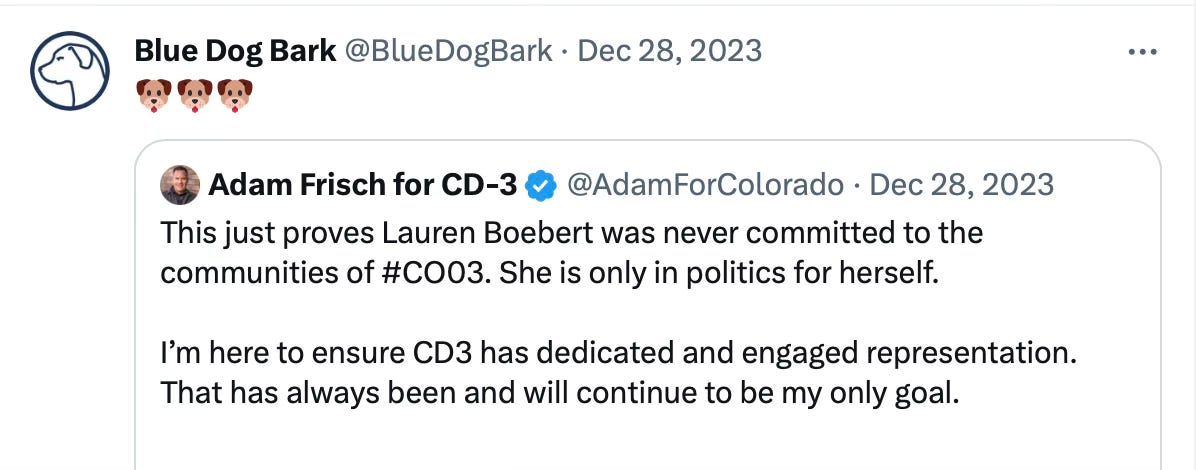January 7th Democrats
Red Dogs, Blue Dogs, and a new litter to beat weirdo MAGA extremists. 2024 is gonna be fun for Team Normal.
Two years ago today, we wrote for The Bulwark about missed opportunities after January 6th. Public opinion of the Republican Party had plummeted, opening up the potential for a new majority coalition to crush the abettors of the MAGA weirdos who desecrated the Capitol. But in the weeks that followed January 7th, the highest-profile Democratic candidate recruitment was … a leftist campaign to find a primary challenger to Joe Manchin. Why?
“The Democrats” are not structured to seize the January 7th opportunity, only an organized faction can do that.
The most organized faction in early 2021 was the “harass Joe Manchin for clicks & cash” faction, not the “woo disaffected Republicans into a majority coalition” faction.
That job would fall to “Blue Dogs and Red Dogs” but in early 2021 the Blue Dog Democrats were decimated and the Red Dog Republicans were still recognizing reality.
By this Bulwark piece, in January 2022, that was starting to change. That week Adam Frisch launched his campaign against Lauren Boebert. Weeks later, Marie Gluesenkamp Perez launched her campaign against another MAGA candidate in another Trump-won district.
Fast forward two years, one is co-chair of a revitalized Blue Dog Caucus endorsing the other while Lauren Boebert is hiring movers.
Factions, not “The Democrats”
It remains shocking that Justice Democrats founders spent the weeks after January 6th grabbing headlines for their recruitment of a challenger to Joe Manchin. But we’ve written enough about the specifics of that effort. The important factor moving forward is why their effort got more oxygen than centrist Democratic initiatives to recruit ex-Republicans.
The reality is “The Democrats” are not structured for such investments:
We live in a political era defined by clear, identifiable factions. We just can’t expect “The Democrats” to be one of them—either as a brand or as an organized allocator of strategic resources that can do things like respond to January 6 with an aggressive recruitment campaign.
That work now falls to entities outside of strict party control. This reality can be leveraged to harm the party—as in the case of Justice Democrats primarying Joe Manchin—or to strengthen it.
As with many other tactics, regular people who don’t work in politics will say “But Don’t The Democrats Do That?”
The natural next question:
So whose job was it to recruit those on the center and center-right who recoiled at the assault on the Capitol?
Our friends at The Bulwark headlined the next section of that piece:
In 2008, 59 Blue Dogs were elected to the U.S. House. In 2021, just 19 members of that centrist Democratic caucus were sworn in days before the insurrection.
Just weeks before January 6, Tim Miller had outlined the new reality of Red Dog Democrats—the sometimes involuntary party-switchers new to the Democrats’ coalition.
In an alternate universe, those five dozen Blue Dogs who came to Washington with Barack Obama would have been recruiting potential Red Dog members of Congress (and their voters) to form a majority that could protect democracy. Instead, the Blue Dogs were themselves an endangered species.
But not all is lost. There are potential leaders with bipartisan credentials who have stepped forward to try to win back districts held by Trump-allied Republicans. These are January 7th Democrats: citizens with appealing backgrounds working across the aisle who have since emerged as strong candidates in winnable Republican-held congressional districts.
The Bark Is Back
Sherlock Holmes, in the Adventure of the Silver Blaze, hones in on the importance of absence:
Scotland Yard detective: “Is there any other point to which you would wish to draw my attention?”
Sherlock Holmes: “To the curious incident of the dog in the night-time.”
Detective: “The dog did nothing in the night-time.”
Holmes: “That was the curious incident.”
January 6th presented a recruitment opportunity, of both candidates and voters, to win the middle with a majority coalition.
The silence of that missed opportunity is a “negative fact”. There are lessons to be learned from the dogs who didn’t bark back in January 2021: the Blue Dogs who won 59 swing districts in 2008 and the highly educated Red Dog voters who flipped blue in the Trump era.
The revitalization of the Blue Dogs this cycle has made headlines:
But it is their election results - co-chairs Mary Peltola, Jared Golden, and MGP represent Trump-win districts - not the headlines that chart a path forward.
In recent weeks, that trio of Trump-district co-chairs have been tweeting out endorsements from a new account literally titled Blue Dog Bark:
Republicans have accused Democrats of living as though every day is January 6. As Bill Kristol has pointed out, democracy is actually more vulnerable now than it was then.
Today is not January 6, 2021.
It is more like January 7th - this has happened, how do we react? This is where we are now, how do we change it?
We change it, by supporting January 7th Democrats: recently converted independents, reformed leftists, ex-Republicans, patriotic ticket-splitters. Blue Dogs and Red Dogs. Barking and biting.
Elementary, my dear Welcome.









